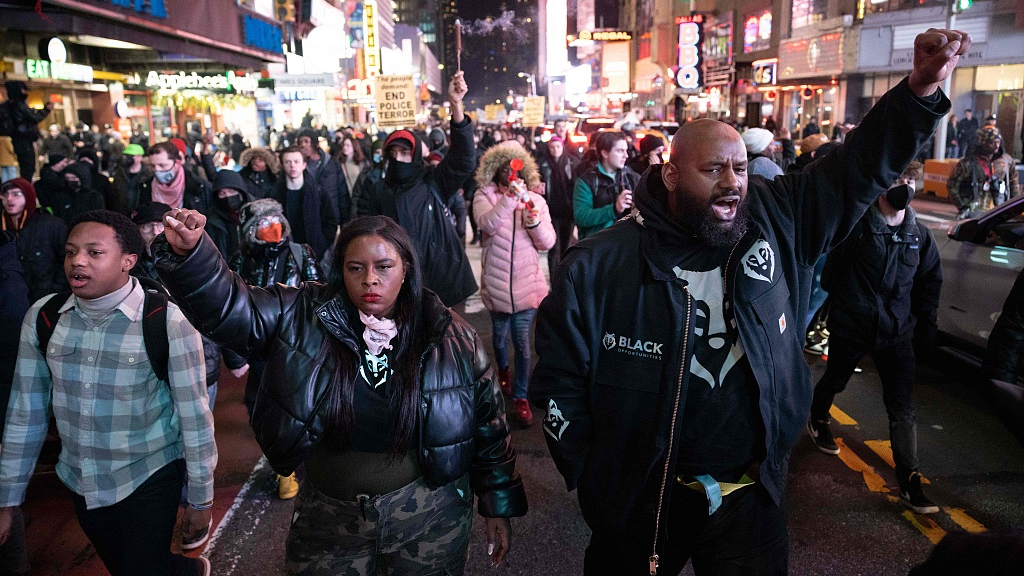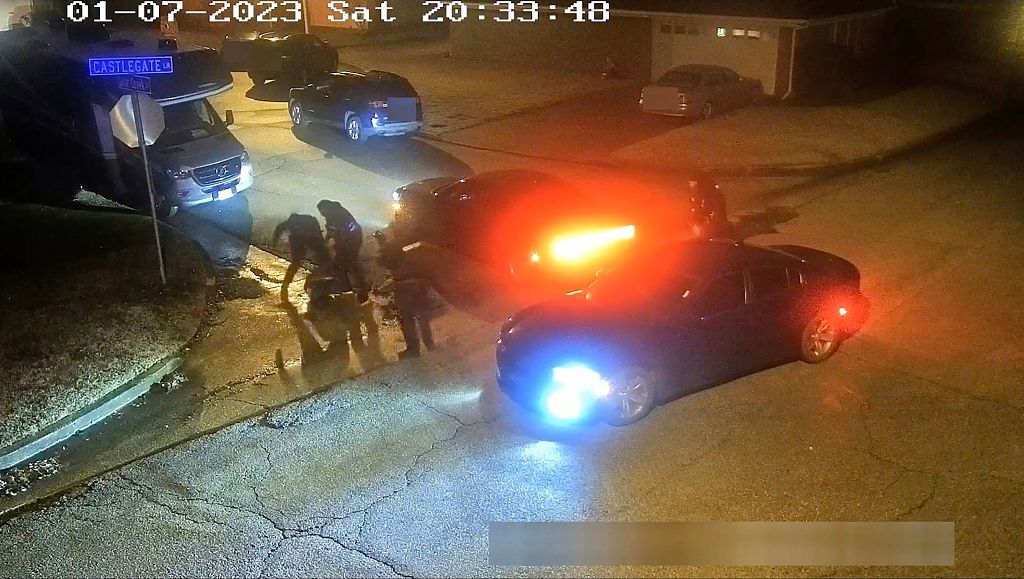
Protesters rally against the police assault of Tyre Nichols at Times Square in New York City, United States, January 27, 2023. /CFP
Protesters rally against the police assault of Tyre Nichols at Times Square in New York City, United States, January 27, 2023. /CFP
Editor's note: Thomas O. Falk is a London-based political analyst and commentator. He holds a Master of Arts in international relations from the University of Birmingham and specializes in U.S. affairs. The article reflects the author's opinions and not necessarily the views of CGTN.
The death of the young African American Tyre Nichols displays once again the spiral of violence in the U.S. While reforms are needed in the policy training and their culture, the problem runs deeper and reflects a microcosm of the nation's violent trajectory.
They were images reminiscent of the death of George Floyd, an African American who lost his life because of a trifle, at the hands of those who are supposed to protect people – the police. The authorities in Memphis reacted appropriately by dismissing the five police officers involved and dissolved the Scorpion unit, which was created to counter the rise in crime in the city.
The judiciary also acted quickly and accused the officers of manslaughter, among other things. These developments are undoubtedly laudable. After all, in the past, such incidents were often covered up or downplayed. The swift approach taken in Memphis should serve as an example for future incidents.
However, it does not address nor tackle the roots of the issues. Police violence itself is and will remain a structural problem in the United States.
The Tyre Nichols case only emphasized that it doesn't matter whether the officers are white and perhaps have racist motives – of whom many also exist, needless to say. However, in this tragedy, the officers who killed Nichols are African Americans themselves.
It has always been apparent that racism cannot be the sole cause of police violence in the U.S. For example, the country has seen a sharp increase in the homicide rate, which criminologists believe results from gun proliferation, pandemic stress, economic hardship and declining public trust in the police.
In addition, the George Floyd case and the criticism of the police caused uncertainty among law enforcement agencies. This was exacerbated by the Democrats' campaign to "defund the police" resources. As a result, the police are losing personnel en masse and often wonder twice whether to even respond to calls from troubled neighborhoods.
Moreover, experts have argued that a specific subculture within the police force, regardless of race, classifies young African American men as perpetrators and dehumanizes them as the cause of the excess of violence that exists.
Thaddeus Johnson, a criminologist, recently told PBS that there is a real internal competition within the police force over brutality and the number of arrests. "What we witnessed was a deadly brew of incompetence, a deadly brew of aggression. Bravado, Machismo, one-upmanship of who can be the toughest person," Johnson continued.

The image from a video shows a brutal attack on Tyre Nichols by five police officers in Memphis, Tennessee, United States, January 7, 2023. /CFP
The image from a video shows a brutal attack on Tyre Nichols by five police officers in Memphis, Tennessee, United States, January 7, 2023. /CFP
While an improvement in training and a focus on de-escalation techniques, which is criminally neglected in the U.S. in favor of paramilitary-style training, is certainly required, just as various other structural changes to the U.S. police system are, it is unclear whether such reforms would have prevented the current tragedy. Let's not forget that in the Nichols case, the officers wore body cams again, but it did not deter them from using deadly force.
Moreover, none of the reform at the police will alter the actual cause here, namely the proliferation of firearms and the environment of fear this has created. If a policeman starts every day thinking it could be his last, as someone could draw a gun at him at any given point, the police lose focus and are no longer about to "protect and serve" but simply to survive. Although that justifies incomprehensible excesses of violence like Tyre Nichols or George Floyd in no way, it adds to the conundrum of why American police will always be inclined to engage in violence without asking too many questions.
It is a vicious circle between the police in fear for their lives and a country obsessed with guns that seemingly cannot be broken.
A look at the statistics speaks volumes. The year 2023 is just over a month old, but 79 people have already been shot dead by the police, according to the Washington Post. If you take the last 12 months, 1096 people have been shot dead by the police – a sad record year since the newspaper began the investigation in 2016.
But police brutality is nothing more than a microcosm of the nation's state of affairs.
Gun violence has kept the United States in suspense for decades, and the new year began the way the old one ended: with numerous mass shootings and many dead Americans.
In January alone, there were 55 mass shootings, almost two a day, the Gun Violence Archive reported. This is not an irregularity in the statistics showing that 690 of these massacres took place over the year 2021, i.e., almost twice per day.
The fact that most of us can only recall a few headlines on the subject shows not only how these events have become sad everyday news in the U.S. and almost disturbing normalcy for those of us on the outside looking in.
And it seems that such a situation is not going to get better but to get worse.
As long as guns remain easily accessible, any sort of police reform thus remains pointless. However, the reluctance with which legislators continue to ignore these developments should concern one the most. It seems apparent that the U.S. is walking into the abyss with its eyes wide open, unwilling to change course.
(If you want to contribute and have specific expertise, please contact us at opinions@cgtn.com. Follow @thouse_opinions on Twitter to discover the latest commentaries in the CGTN Opinion Section.)